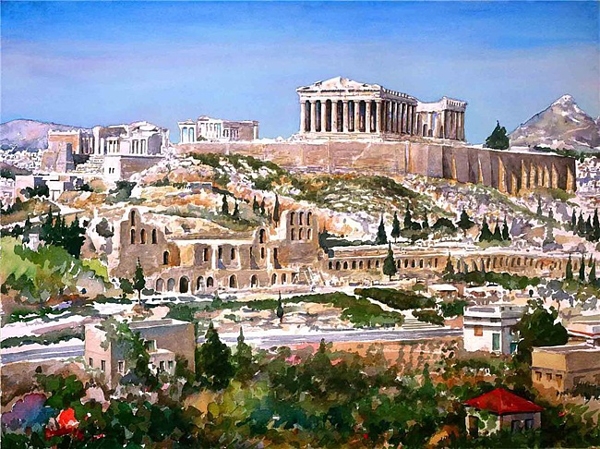When one pictures a Greek city-state, one pictures a beautiful city with a great leader to guide it, to give it courage in battle, and most importantly, to give its people hope. This Greek city-state was Athens, and this great leader was Pericles. Born in Athens in 495 B.C.E., Pericles was a prominent and influential statesman, orator, and general of the very powerful Athens.1 Pericles was a strong believer in the arts, literature, and philosophy. He was responsible for the full development of the Athenian democracy that shaped Athens’ politics and culture.2 Although Athens was enjoying a golden age while led by Pericles, this soon came to an end and thus began the fall of Athens.

That fall began in 431 B.C.E. when the 27 year long Peloponnesian War began. This long and bloody war was between the two most dominant Greek city-states, Athens and Sparta, along with each side’s allies. The war began when conflicts arose after the Greco-Persian Wars. Both Athens and Sparta longed for dominance, and in May of 431 B.C.E., war broke out between them. Pericles knew Athens’ strength was in their navy, so his strategy was to avoid Sparta on land, because he knew that on land, Athens would be no match for Sparta. What he failed to realize, however, is that crowding the population of Athens behind its Long Walls would be deadly if disease ever broke out in Athens while Sparta had it besieged.

In an attempt to please his people and praise those who had fallen in the war, Pericles gave a funeral oration in which he spoke highly of those who had given their lives for the democracy. In his speech, he tried to regain the peoples’ trust and remind them of the many victories they had had that were led by him. Pericles’ praised the Athenian people and spoke of how proud he was of them and how far they had gotten thus far. He gave Athens the title of being a model for the other surrounding Greek city-states because Athens showed its dominance. He also went on to compare Athens to Sparta. Sparta focused only on their strong and strict military whereas Athens focused on its city and the helping of each other as one in times of need, which only makes them stronger because they are “just as brave” as Pericles states.3
After cruising around Peloponnese as Pericles had ordered, he arrived in Attica where the plague began to appear among the Athenians. Sickness spread fast and there was nothing the Athenians could do to stop it. Physicians became infected and died much faster than other people because they were exposed to the sick more often. Not many survived this plague, but Thucydides, a general and historian of Athens, lived after having contracted the plague and lived to tell the tale of the Peloponnesian War. His history of this war is contained in The History of the Peloponnesian War. In this book, he writes of the chronological order of the war and the downfall of Athens due to the plague. Thucydides writes that while the Peloponnesians invaded Attica, the Athenians left and fled to their ships. Countless Athenian people were dying in battle and from the plague. The Peloponnesians feared the disease and watched as burials went on, but remained about forty days in Attica ravaging through the town.4

After the second invasion of Athens by the Peloponnesians, the Athenians began putting more blame on Pericles for declaring and leading a war that brought great suffering to the people of Athens. They began blaming Pericles for the death of one-quarter of its population. After about two years, the great general and leader of Athens was no longer wanted and was not selected to continue being their general the following year.5 What no one knew, however, and what is still a debate to this day, is what the plague really was. No one knows what disease or diseases were responsible for this plague. There have been ongoing studies to find what diseases could have possibly been the cause of the numerous deaths. Although some results have been discovered, there is no clear answer to the ongoing question: what was the infamous death that killed a third of the population of Athenians? The most common and most discussed diseases among scholars for the most reasonable explanations for the plague include: bubonic plague, influenza, typhoid fever, smallpox, epidemic typhus, and measles.6 Any of these diseases could be the cause of the plague, but there is not enough microbiologic evidence to pinpoint which disease or diseases specifically were the cause of the Athenian plague. This lack of evidence is the reason for the constant disagreement between scholars.
The plague, along with the battles fought during the war, killed a great portion of the people of Athens, and as the Athenians became weaker and weaker, they received even worse news. Pericles contracted the plague, and unlike Thucydides, he did not recover and in fact died in 429 B.C.E. leaving Athens without a general, and to fend for themselves. After his death, the government of Athens became unstable and was not able to get organized in order to continue fighting the war. With the constant invasions, people still dying from the plague, and the death of Pericles, the Athenians continued fighting until a decade and a half later, they surrendered. By the time the Peloponnesian War ended in 404 B.C.E., Athens had fallen leaving Greece weak and fractured. The fall of Athens set off chain reaction for the fall of Sparta, then eventually, the end of Classical Greece.
- New World Encyclopedia, April 2015, s.v. “Pericles.” ↵
- Encyclopædia Britannica , April 2017, s.v. “Pericles,” by David Malcolm Lewis. ↵
- Salem Press Encyclopedia, January 2017, s.v. “Analysis: Pericles’ Funeral Oration,” by Charles Forster Smith. ↵
- Thucydides, and Richard Crawley, The History of the Peloponnesian War (Auckland, N.Z.: The Floating Press, 2008), 64. ↵
- Salem Press Encyclopedia, January 2016, s.v. “Peloponnesian War,” by Jeffrey Buller. ↵
- Burke A. Cunha M.D., The Cause of the Plague of Athens: plague, typhoid, typhus, smallpox, or measles? (Infectious Disease Clinics of North America, 2004), 30. ↵



56 comments
Bictor Martinez
The painting as shows in the beginning of the article of Athens is such a beautiful city. How can people with limited tools build building and structures of that extent thousands of years ago? This comes to show how intelligent the people of Athens were, but not enough to create treatment for the diseases that broke out that killed 1/3 of their population. The war that occurred between the Athens and Spartans should not have occurred. Both of these cities were developing at a great rate where if they set aside their differences they could built a great empire, however all empires have to come to an end.
Raymond Munoz
In elementary school I became very fond of Greek mythology, but I never dove into the history of Classical Greece. Even though I never knew some of the details of Classical Greece I still understand that in all of history good things don’t last forever. So, when the Athenians lose their faith in Pericles and lose the control of their home it makes sense to me because cultures and people are bound to change into something different eventually. The author does an amazing job of keeping the article short enough to keep interest but informative enough to learn some of the rich history.
Jonathan Perez
The fall of Greece has always been a topic of much debate as to what could have been done to prevent it. The author does a good job of describing the issues taking place in Athens and how it was a chain reaction that would go on through the rest of Greece. One thing I did notice was a slight hiccup when discussing the Spartans in that it said they were known for their navy when I am sure she meant army as she mentioned land later in the sentence, this however does not take away from the key points of the rest of the article and the overall delivery of the piece.
Maria Mancha
Greek history is always a fascinating topic, I really enjoyed how much more details you brought to your article rather than the basic overview of Athens. Its so interesting how the plague a disease could wipe out so many people especially in a great civilization. War did not help in the death of people, it just killed more people. I had never really learned about Periciles so I liked how you showed how proud he was of the Athens. I enjoyed your conclusion especially how you stated the end result of Athens led to a chain reaction to the end of the Greece all together. Overall I really enjoyed the articled and the details you had inside them.
Rafael Lopez-Rodriguez
Every great empire has to come to an end. What seemed as a forever ruling empire like Rome fell as well. Everything has its end. Whenever I think of a European country like Greece, I think of a beautiful must visit city. Greek history has always been complicated to understand for me. But this article gave me a better understanding on how this empire began to fall. Great article!
Anna Guaderrama
This was a really interesting article, it was super informative and I feel like it gave the overall topic justice. Although I learned an overall idea of the fall of Athens back in high school I feel like this really cleared things up for me and actually allowed me to learn about it in more detail and not just what happened during a certain date. I especially found the introduction to be super interesting and attention grabbing.
Edgar Ramon
Could it have been some sort of variation of small pox and black plague. I don’t know why but, it seems as if most epidemics in ancient and medieval history are those that include symptoms such as skin lumps or abscesses. We may look at these long gone epidemics as just something that happened, without having any feelings about it, but imagine how utterly devastating these waves were. Your neighbors, family, the street corner merchant simply drop dead one day. It is truly a miracle that the historian Thucydides survived and was able to preserve pre-plague history.
Suvesh Vasal
the compare and contrast of Athens before and After was amazing. I’m amazed that so many people died so quickly due to the plaque. Athens literally fell off the map. The questions surrounding the fall of Athens is still very interesting. I have yet to understand why cities were so territorial and fought each other. this has probably added to the list of reasons of why many once powerful states have fallen.
Thomas Fraire
Great job on portraying Athens before it’s fall and Athens after it’s fall. I believe it’s very unusual despite everything we don’t realize what torment slaughtered the general population of Athens. In spite of the fact that we didn’t have the innovation to make sense of it in those days, I’m certain we have the innovation now it’s simply I don’t know whether we have enough confirmation. It’s intriguing how at last the general population of Athens began to point the finger at Pericles and afterward after his passing, they endured much more
Bryan Martin Patino
History is comprised of many cultures and civilizations that thrived for centuries and eventually would succumb to the spoils of human nature. Athens is no exception to this historic trend. The unexpected disasters that befell this once great city-state are reminder that human ingenuity can be triumphed over by a combination of man’s folly and nature. I enjoy reading articles such as this due to their hidden themes that entail the consequences and effects of destruction.